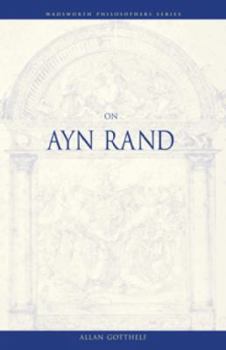On Ayn Rand (Wadsworth Philosophers Series)
(Part of the Wadsworth Philosophers Series Series)
Select Format
Select Condition 
Book Overview
Customer Reviews
Rated 5 starsA clearly written introduction to Objectivism and Ayn Rand
Allan Gotthelf succeeds at condensing Ayn Rand's entire integrated philosophy of Objectivism into a short (97 pp.), easy to read introductory book. Most of the book is devoted to presenting the core of the philosophical system -- metaphysics, epistemology, and ethics -- but there is a glance at politics and esthetics, and two chapters are devoted to a biography of Ayn Rand. Gotthelf argues that philosophy is not an esoteric...
0Report
Rated 5 starsInvaluable re-introduction to Rand
Millions of readers have recognized that Ayn Rand's novels present a revolutionary view of morality and politics. Sadly, however, very few of these readers--whether Rand's admirers or opponents--possess an adequate grasp of the foundations of her philosophic system. By focusing on her metaphysics, epistemology, and ethics, "On Ayn Rand" presents a sympathetic, intellectually rigorous introduction to this philosophic system...
0Report
Rated 5 starsShort is Sweet
Allan Gotthelf's short book allows you to hold Ayn Rand's philosophy and sense of life in one breath which makes her philosophy very real to any reader. He starts with what attracts people to Ayn Rand-her benevolent universe premise and her heroic view of man-and establishes that hers is not a universally held view, and even the cause of hostility towards Ayn Rand. He then asks which is true? Is life inherently tragic or...
0Report
Rated 5 starsBEST SHORT BOOK ON AYN RAND EVER WRITTEN
A plus. It doesn't get any better than this. In 100 pages, Dr. Gotthelf draws on everything known about Ayn Rand, from her novels, books, articles, journals, even spoken lectures and interviews, and gives the correct essentials. The emphasis is on her underlying philosophy, Objectivism, 'the philosophy for living on earth.' The politics of capitalism are only briefly sketched in. He clearly explains Ayn Rand's most complex...
0Report
Rated 5 starsBEST SHORT BOOK ON AYN RAND
A plus. It doesn't get any better than this. In 100 pages, Dr. Gotthelf draws on everything known about Ayn Rand, from her novels, books, articles, journals, even spoken lectures and interviews, and gives the correct essentials. The emphasis is on her underlying philosophy, Objectivism, 'the philosophy for living on earth.' The politics of capitalism are only briefly sketched in. He clearly explains Ayn Rand's most...
0Report













